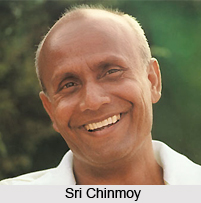 Sri Chinmoy was an Indian Philosopher and Guru as well as a prolific author, composer, artist and athlete. He was best known for holding public events on the theme of inner peace and world harmony. His teachings emphasized love for god, daily meditation on the heart, regular service to the world, and religious tolerance.
Sri Chinmoy was an Indian Philosopher and Guru as well as a prolific author, composer, artist and athlete. He was best known for holding public events on the theme of inner peace and world harmony. His teachings emphasized love for god, daily meditation on the heart, regular service to the world, and religious tolerance.
Sri Chinmoy was born as Chinmoy Kumar Ghosh in the small village of Shakpura(now in Bangladesh) in the year 1931. Sri Chinmoy was the youngest of his seven siblings. In the year 1944,both his parents passed away and twelve years old Chinmoy entered Sri Aurobindo`s Asram in Pondicherry in South India, which was a spiritual community. Here he spent the next twenty years in spiritual practice, including long hours of meditation, writing poetry, essays and spiritual songs as well as spent several hours in practicing athletes.
Chinmoy showed profound inner experience from his early teens. In the subsequent years he achieved many advanced states of meditation. In the year 1964, Sri Chinmoy went to New York City to share his inner wealth with the west.
Sri Chinmoy could understand aspiration and heart`s perpetual longing for higher and deeper realities, as the spiritual force behind all great advances in religion, culture, sports and science. A feeling of self-superiority can bring out the best in men and women and put their heart in true satisfaction. He said that: "Our goal is to go from bright to brighter to brightest, from high to higher to highest. And even in the highest, there is no end to our progress, for God Himself is inside each of us and God at every moment is transcending His own Reality."
Sri Chinmoy had disciples from sixty countries around the world. He encouraged a balanced lifestyle that incorporated both inner disciplines of prayer and meditation with the dynamic progress in contemporary life.
Sri Chinmoy exhibited a boundless creativity. He was an ardent follower of music, painting, poetry, literature and sports. He had contributed in each of this field with a striking expertise. Sri Chinmoy traveled throughout the world frequently for the concerts, lectures and public meditations, to meet with his followers and to meet and discuss spirituality with the community leaders from all over the world. He did not charge a fee for his spiritual guidance, concerts, lectures and public meditations.
Sri Chinmoy entered Mahasamadhi , the mystic process by which spiritual masters leave their body on the morning of 11th October, 2007.









